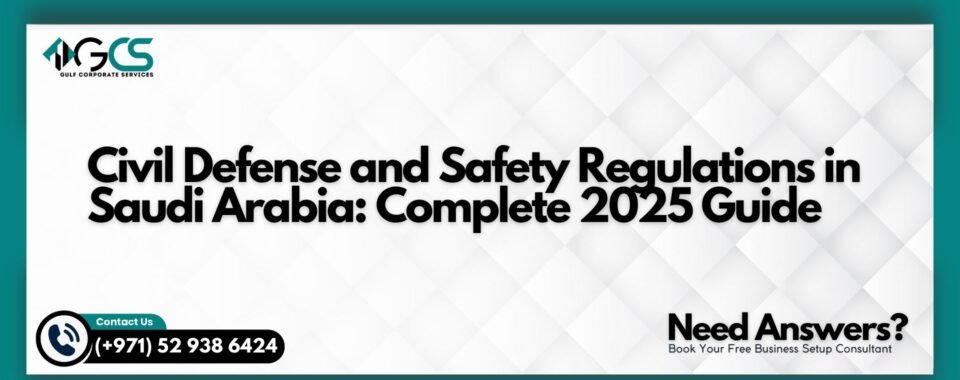
In 2025, civil defense and safety regulations in Saudi Arabia are more important than ever. With rapid urban growth, industrial expansion, and the launch of mega projects under Vision 2030, Saudi authorities are focused on enforcing strict safety protocols across construction sites, factories, commercial buildings, offices, schools, and public spaces.
Whether you are a business owner, project developer, facility manager, or safety consultant, understanding and complying with the Saudi Civil Defense safety requirements is not optional—it’s essential. This detailed guide breaks down all the major aspects of safety regulations in Saudi Arabia, including fire protection systems, building compliance, emergency planning, equipment standards, and inspection procedures.
Let’s explore everything you need to know to stay compliant, protect lives, and avoid costly penalties.
Understanding Civil Defense Authority in Saudi Arabia
The General Directorate of Civil Defense (GDCD) is the government body responsible for implementing safety policies across the Kingdom. It falls under the Ministry of Interior and oversees:
- Fire prevention and firefighting
- Emergency rescue operations
- Hazardous materials management
- Safety inspections and approvals
- Industrial and structural safety
Role of the General Directorate of Civil Defense
The GDCD enforces civil defense laws in Saudi Arabia by:
- Approving building designs from a safety perspective
- Issuing and renewing safety licenses
- Conducting regular and surprise inspections
- Investigating fire accidents and issuing legal penalties
- Coordinating disaster response and public awareness campaigns
Why Safety Regulations Are Critical in Saudi Arabia
Saudi Arabia safety regulations are not just about compliance—they are about saving lives. In a country where the construction and oil sectors dominate, strict enforcement of fire safety codes, evacuation plans, and hazard control protects millions of workers, residents, and visitors.
Growing Importance of Civil Defense in 2025
As mega-projects like NEOM, Qiddiya, and The Red Sea Project reach new stages, there is a massive increase in building permits and safety inspections. Developers must align with updated 2025 safety codes in Saudi Arabia to receive operational licenses.
Building Design and Structural Safety Requirements
All new buildings in Saudi Arabia—residential, commercial, or industrial—must comply with the Saudi Building Code (SBC). Safety is integrated into structural planning from day one.
Mandatory Building Safety Features
To meet civil defense approval, your building must include:
- Emergency exits that are easily accessible and clearly marked
- Smoke detectors and fire alarm systems on all floors
- Fire-resistant doors, walls, and escape paths
- Fire extinguishers or suppression systems in designated areas
- Adequate emergency lighting in hallways and stairwells
- Elevator safety protocols and manual override systems
Fire Safety and Protection System Requirements
Fire safety is the most strictly monitored component of civil defense regulations in Saudi Arabia. Every facility must have an integrated fire safety system approved by a licensed fire safety consultant.
Fire Alarm Systems
Your fire detection and alarm system must:
- Be connected to central monitoring stations
- Trigger audible and visual alerts in all areas
- Include manual pull stations near exits
- Be regularly tested and maintained
Fire Suppression Systems
Depending on the facility, you may require:
- Sprinkler systems for high-rise buildings
- Gas-based suppression systems in data centers
- Foam systems for oil storage or refineries
- Fire blankets and portable extinguishers for small offices
Emergency Evacuation Plans and Drills
All facilities must prepare a documented emergency response plan, covering evacuation procedures, fire control steps, and first responder communication.
Requirements for Evacuation Readiness
- Floor plans with exit routes clearly marked
- Designated assembly points outside the building
- Staff training in evacuation and rescue procedures
- Mock fire drills conducted at least once every 6 months
These plans must be submitted to Civil Defense during the license application and renewal process.
Safety Licensing and Approvals
You cannot operate any commercial or industrial facility in Saudi Arabia without a valid civil defense safety certificate. This applies to:
- Malls and retail stores
- Restaurants and cafes
- Schools and universities
- Hospitals and clinics
- Warehouses and manufacturing units
Civil Defense License Process
- Submit architectural drawings for safety review
- Hire a certified safety consultant
- Install required systems (alarms, extinguishers, etc.)
- Schedule an inspection with Civil Defense
- Make modifications, if needed
- Get final approval and safety certificate
Fire Extinguishers and Safety Equipment Standards
The equipment used for fire safety must meet the Saudi Arabian Standards Organization (SASO) or international safety codes.
Mandatory Safety Equipment
Your facility must have:
- ABC-type extinguishers for general fires
- CO2 extinguishers near electrical equipment
- Fire hoses or hose reels in large spaces
- Personal protective gear in hazardous zones
- First aid kits in accessible areas
Each piece of equipment must have visible inspection tags and be checked monthly.
Industrial Safety Regulations
Industrial zones, oil fields, refineries, and chemical plants have specific industrial safety regulations enforced by Saudi Civil Defense and Royal Commission for Industrial Cities.
High-Risk Facility Requirements
These facilities must implement:
- Hazardous material containment systems
- Explosion-proof lighting and wiring
- Gas leak detection systems
- Access control and surveillance
- Full-time safety officers on-site
Failure to comply with industrial safety laws can result in immediate shutdown and legal action.
Worker Health and Occupational Safety
Saudi Arabia’s occupational safety regulations aim to protect workers from workplace hazards and ensure proper working conditions.
Employer Responsibilities
Employers must:
- Provide personal protective equipment (PPE) to all workers
- Offer regular safety training programs
- Ensure workplace ventilation and lighting meet standards
- Prevent overexposure to heat, chemicals, or machinery
Workers must be trained on handling emergencies, reporting unsafe behavior, and using emergency tools.
Safety Signage and Awareness Protocols
Every building must have clear, bilingual safety signs in Arabic and English. These include:
- Exit signs
- Fire extinguisher locations
- No smoking zones
- Chemical hazard warnings
- Emergency contact numbers
Regular awareness campaigns for tenants, staff, and contractors are also encouraged by the Civil Defense.
Vehicle, Parking & Transportation Safety
Safety isn’t limited to buildings. Parking lots, loading bays, and fuel stations must follow special safety protocols.
Transport Safety Regulations
- Emergency shut-off valves at fuel stations
- Fire barriers between fuel tanks and buildings
- Vehicle flow systems in large parking garages
- Emergency fire alarm buttons accessible to drivers
Inspection and Compliance Enforcement
Civil Defense performs scheduled and unannounced inspections of all active buildings and construction sites. They check:
- Functionality of safety systems
- Maintenance records of equipment
- Staff training and awareness
- Emergency drill logs
- Civil Defense permit validity
Non-compliant businesses face:
- Temporary closure
- Heavy fines (up to SAR 100,000+)
- Revocation of operational licenses
Digital Systems and Smart Safety Integration
In 2025, Saudi Arabia’s safety system is moving toward automation and smart monitoring. Some of the smart integrations include:
- Real-time fire alarm system monitoring
- Cloud-based safety reporting tools
- QR-code linked equipment logs
- Automated alerts to Civil Defense stations
Large facilities are now encouraged to digitize all safety reports and maintain online compliance dashboards.
Penalties for Non-Compliance
Ignoring Saudi Civil Defense regulations can lead to:
- SAR 5,000 to SAR 100,000 in fines
- Daily penalties until issues are resolved
- Cancellation of safety licenses
- Project shutdown or demolition orders
- Legal charges in the case of injury or death
How to Stay Compliant: Proactive Measures
To avoid violations:
- Hire a licensed safety consultant
- Train staff regularly
- Maintain inspection logs
- Renew permits on time
- Conduct mock drills
- Display safety signs prominently
- Document all safety protocols
Conclusion
The enforcement of civil defense and safety regulations in Saudi Arabia is not just about ticking boxes—it’s about ensuring that every building, site, and workplace is safe for everyone inside and around it. From detailed building requirements to fire safety systems, emergency plans, and digital monitoring, Saudi Arabia is setting high standards for safety across every sector.
Whether you’re running a commercial store, building a hotel, or managing a large industrial site, full compliance with these regulations is mandatory. Staying ahead of safety expectations shows your commitment to quality, responsibility, and public well-being.
If you’re starting a business or setting up a facility, it’s critical to integrate civil defense compliance from day one. You can’t complete construction or begin operations without proper safety certification.
That’s why working with experts who understand the full scope of legal, architectural, and safety standards is essential. We help you with every step of your Company formation in Saudi Arabia—from initial registration to safety compliance and beyond.
FAQs
Is it mandatory to have a Civil Defense license in Saudi Arabia?
Yes, you must have a valid Civil Defense certificate to legally operate any facility in Saudi Arabia.
What happens if my building fails a Civil Defense inspection?
You may face fines, temporary closure, and be given a period to correct the issues before re-inspection.
Do I need a safety consultant to get approval?
Yes, only licensed safety consultants can design, submit, and oversee fire and safety systems for approval.
How often are fire drills required?
Fire drills must be conducted at least once every six months, and records must be maintained for review.
Can I apply for my commercial license without a safety certificate?
No. Your municipality license and commercial operations depend on having an active and valid safety approval.








